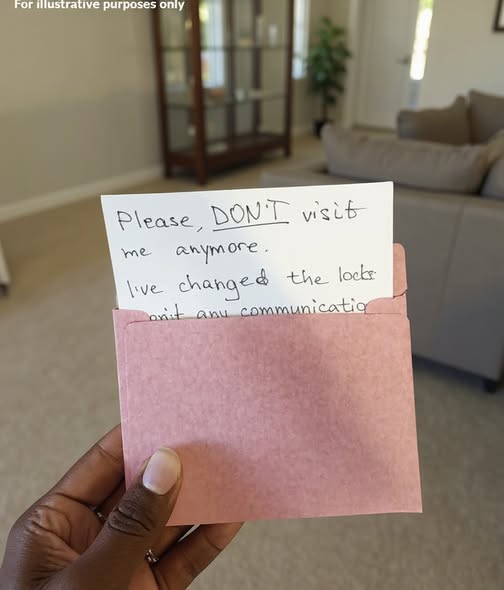Mom always looked uncomfortable during my parent-teacher meetings at school. I thought she was ashamed for being poorer and less educated than the other parents. But one day, after the meeting, I glimpsed her shadow kneeling behind a tree. As I silently approached, I saw a student standing in front of her, a small boy from the younger grades, holding out a lunchbox. My mother was rummaging inside it.
At first, I froze. My heart thudded, and the first awful thought that hit me was, Is my mother stealing food? But then I noticed the boy was smiling, nodding, and pointing at something in the box. Mom carefully took out a sandwich wrapped in foil and slipped it into her bag. She patted his shoulder like they shared a secret.
I didn’t say anything then. We walked home together, her chatting about my teacher’s compliments, me trying to keep my face neutral. But my mind kept spinning—why would she take food from a little kid? That night, I pretended to do homework while listening to her in the kitchen. She opened her bag, unwrapped the sandwich, and began cutting it into small pieces before placing them in the fridge.
The next day, I left school early, telling my teacher I felt sick. I waited outside until the final bell, watching from a distance. And sure enough, Mom lingered after my meeting ended, heading toward that same tree. The same boy was there, but this time he handed her not just a sandwich, but also a small juice carton. She thanked him softly and tucked the items into her bag.
Finally, I confronted her on the way home. “Why are you taking food from that kid?” I blurted out. She stopped walking, eyes wide, then looked away toward the pavement. “It’s… not what you think,” she murmured. I asked her again, my voice sharper. That’s when she told me the boy’s name—Manuel—and that his father owned a small bakery near the school.
Apparently, a few months ago, she had been walking past the bakery when she saw the owner arguing with a supplier. She didn’t catch the words, but she noticed flour sacks spilling open. She stepped in to help clean up, even though she didn’t know them. Manuel’s father insisted on giving her bread as thanks, but she refused, embarrassed. A week later, he sent Manuel to bring her lunch at my school meetings as a quiet gesture.
I wanted to believe her. I really did. But something about the way she avoided my eyes didn’t sit right with me.
A week later, things took a stranger turn. I overheard Mom on the phone, whispering: “Yes… I can meet you there… after his classes.” I assumed “his” meant me, but then she added, “And I’ll bring the envelopes.” My stomach sank. Envelopes? Meeting who?
I followed her after school. Instead of heading home, she walked two blocks over to a faded green building I’d never noticed before. She went inside, and after ten minutes, came out holding an empty tote bag. I rushed home before she could catch me. That night, I searched her room while she showered. In the bottom drawer, beneath a pile of scarves, I found a stack of crumpled envelopes. Inside each were coins and small bills—not a fortune, but more than I’d ever seen her stash before.
The next morning, I couldn’t hold it in. “Are you working some kind of side job you’re not telling me about?” I asked. She froze with the kettle in her hand. “It’s complicated,” she said quietly. “I just… help someone out sometimes.” I wanted to push, but the look on her face stopped me.
Weeks passed, and the strangeness kept piling up. She’d leave before dawn some days, come home smelling like flour and sugar, sometimes even fish. Other times, she was gone only an hour but came back with small bundles wrapped in cloth. She never explained.
The real twist came one rainy Thursday. I stayed late at school for a group project, and as I walked out, I spotted Mom again—only this time, she wasn’t by the tree. She was in the cafeteria, standing behind the counter, ladling soup into bowls for a group of kids who didn’t look like they could afford lunch. She moved quickly, smiling, making sure everyone got seconds.
I ducked back before she saw me. Later, I went to the cafeteria manager, pretending I needed to ask about lunch tickets. I casually mentioned the woman serving food earlier. The manager smiled. “Oh, that’s Rosa. She volunteers here whenever she can. Helps cover the shift when we’re short-handed.”
It clicked. The sandwiches, the juice cartons, the early-morning disappearances—they were all part of her way of helping kids and families around town. The envelopes in her drawer weren’t wages; they were donations from shop owners she helped, which she then passed on to people in need.
When I finally confronted her again, I didn’t accuse—I just asked, “Why didn’t you tell me?” She sighed, wiping her hands on her apron. “Because it’s not about being seen. It’s about the people who eat because of it. And maybe… I didn’t want you to think less of me for not having a ‘real job.’”
I told her I’d never think less of her. In fact, I’d never been prouder. From then on, I started helping her. Some mornings we’d pack extra sandwiches together, or carry boxes to the community center. I learned the bakery owner had been one of the first to donate supplies after Mom helped clean up that day. Others followed when they saw she didn’t take anything for herself—except the occasional sandwich when we were too tired to cook.
One day, while we were handing out lunches in the park, Manuel’s father came by and said, “Your mother is the reason three families made it through last winter.” I looked at her, and she just shrugged like it was no big deal.
The biggest twist came months later when the school principal called me into the office. I thought I was in trouble, but she just smiled. “Your mother’s work has inspired a lot of people. We’re starting a permanent food program here, and we’d like to name it after her.”
When I told Mom, she was quiet for a long time. Then she said, “If it helps feed even one more child, then fine. But only if they don’t make a fuss about it.”
Looking back, I realize I wasted so much time feeling embarrassed by what I thought was her shame. The truth was, she wasn’t hiding because she was lesser than the other parents—she was hiding because she didn’t care about the recognition, only the result.
The lesson? Sometimes the people who seem the smallest are quietly moving mountains. And love—real love—is often served without an audience.
If you’ve got someone in your life who gives quietly, tell them you see them. They might pretend they don’t care, but deep down, it matters.
If this story touched you, share it with someone who could use a reminder about the quiet heroes in our lives—and don’t forget to like this post so more people hear it.



